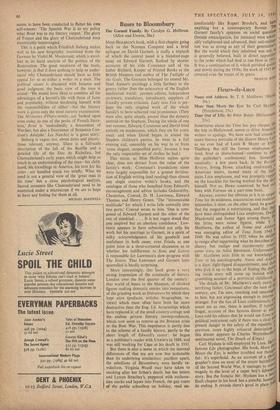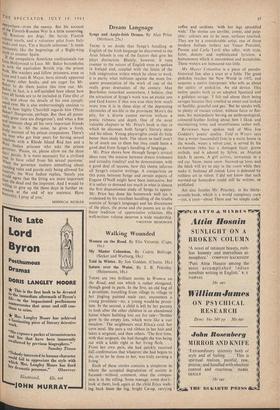Fleurs-de-Luce
More than Meets the Eye. By Carl MOO'
, (Hutchinson, 25s.) SOMETHING about the Time Inc. pay cheque. the trip to Hollywood, seems to drive America° writers to apology. We have now had almost as many literary portraits of the illusive Henry l-nc! as we ever had of Louis B. Mayer or Irviol' Thalberg. But still the former employees—re,, tired, fired or disenchanted—continue to so'l" the publisher's confessional box. SometiO comically: a few years back, in the Par1isa,4 Review, Irving Howe. attacking conformity American letters, named many of the Nod' stairs Luce employees, and was promptly rapPel on the knuckles for having worked for the des'l himself. Not so, Howe' countered, he had 00 been with Fortune on a part-time basis.
Anyway, correct but obvious as it is to suspe* Time for its snideness, inaccuracies and malicioci innuendos, it must, on the other hand, be grant that the magazine is entertaining, and that the,,r, have been distinguished Luce employees, Dvv164 Macdonald and James Agee among them. 13`: the latter were minor figures, while T. Matthews, the author of Name and Addre00 was managing editor of Time from 1943 ti 1949. He was editor in 1952 when he decide, to resign after suppressing what he describes ast, clumsy but malign and murderously mean cover story on Adlai Stevenson. Unfortunatl Mr. Matthews adds little to our knowledge , Time in his autobiography. Name and Adrift); is a dour, tight-lipped disappointment, and th05, who pick it up in the hope of finding the dathili ing inside story will come up instead with grumbling account of a provincial childhooci.,i. The details of Mr. Matthews's early years. Pt; terrifying father, Cincinnati after the turn Of till century, are, I'm sure, touching and meaninglI to him, but not engrossing enough to interet stranger. For the fan of Luce confessionals, If count me as one, there is another, if typien.4 frugal, account of that famous dinner at Luce told his editors that he would use Time 55„o political instrument only if there was a clear 0,"A present danger to the safety of the republic. 'of previous, more highly coloured description this dinner appears in Charles Wertenbani4e sentimental novel, The Death of Xings.)
Carl Mydans is still employed by Luce.
FIc:500 famous Life photographer. His book, More filo, Meets the Eye, is neither troubled nor thongto, ful: it's superficial. As an account of a Ph° 0 grapher's time on most of the major battlefroo, of the Second World War, it manages to red n'il tragedy to the level of a super boy's ifivenitiff, story. But the frenetic Mr. Mydans has a tOjyr Each chapter in his book has a punchy, huninlo, tic ending. It reveals there's good in plain f, everywhere--even the enemy. But his account the Finnish-Russian War is a little unnerving. All Russians are dogs,' the heroic Finnish c(3.1(mel snarls, and a volunteer pilot from Italy winks and says, 'I'm a bicycle salesman.' It reads °alioously like the beginnings of a Right-wing nlYth to counter Spain. If the compulsive American confessionals run "Thri Hollywood to Luce, Mr. Baker buttonholes with the equivalent British trip, the prison ?cok. His warders and fellow prisoners, even as ce and Louis B. Mayer, have already appeared 1„n many other books. and are eager for Mr aker to do them justice this time out. Mr. .Baker, in fact, is a self-satisfied bore about how KLe.en all hands are to be included in Time Out of Ile. and about the details of his own compli-
ctated case. He is also embarrassingly anxious t..)US how highly Churchill regards him (Teter
ca,ker? Dangerous, perhaps. But then all poten- alallY great men are dangerous), and what a fine v.n.d innocent chap all his very important friends 1:1Ink he is. All the same, he gives a fresh, the account of his prison companions. There's e Ton who got four years for having sexual r‘Vations with a Rhode Island Red hen and a est Indian prisoner who asks the prison gdovernor, 'Please, sir, please allow me the three man parole. It is more necessary for a civilised
to have relief from his sexual passions.'
he o. the governor mutters something about clanding rules and parole only being allowed for lonerals, the West Indian replies, 'Surely you v't:ould agree that the living are more important 1,1v1.49i the dead and the impotent. And I would be „s1.11111, to give up the three days in further re- tssIon at the end of my sentence. Have gurnanity, I pray of you.'
MORDECAI RICHLER



































 Previous page
Previous page